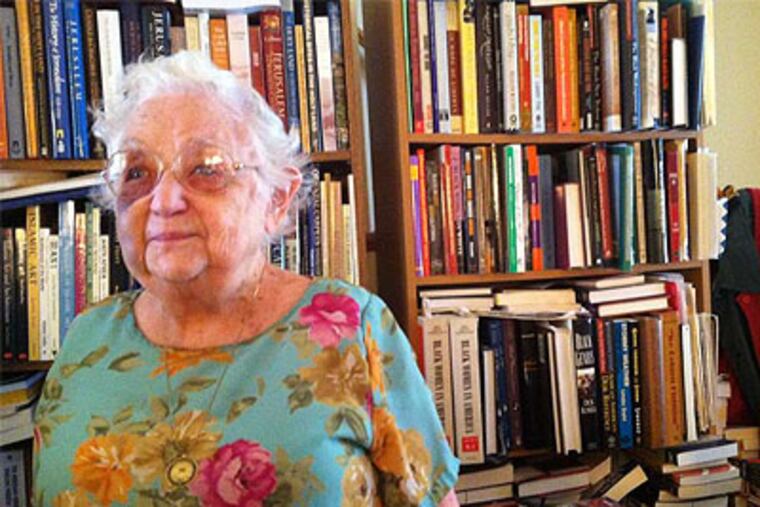Daniel Rubin: Dynamo leads the cheers for Girls High grads
Dorothy Kapenstein has explained, a couple of times now, how what I really want to be writing about is not her but the amazing other women who have attended her alma mater, Philadelphia High School for Girls.

Dorothy Kapenstein has explained, a couple of times now, how what I really want to be writing about is not her but the amazing other women who have attended her alma mater, Philadelphia High School for Girls.
Even if this 4-foot-7 force of nature in a flowered house dress has just handed me her business card, which reads:
"Bubbe, the world's oldest standup/sit down comedian."
She instructs me to type, as she hovers around her dining room table, which is command central for a luncheon she is putting together on Oct. 19 to welcome 11 new Distinguished Daughters of her school's Court of Honor. She could not be more proud.
"Let me tell you about the Blumberg twins," she says. Doris and Shirley, class of 1942, were featured in the film Secret Rosies. Upon graduation, the Grays Ferry sisters were recruited to serve the war effort as human computers in a ballistics research lab forming at Penn.
"And people will tell you - or they told me as a kid - that women couldn't do math or science," Kapenstein says with a harrumph. "These women were geniuses."
They'll join Alma Kuppinger Forman, class of '44, the first woman to graduate from Drexel in civil engineering, and trucking company president Norma Molitch Deull, class of '51.
"Now this is fascinating," Kapenstein says. "When big theatrical shows went on tour, they had to take their sets with them. The only theaters they could perform in were near railroad depots. Her father started a trucking company for theater. Now they could go to the farthest corner of the country and the smallest towns. She runs the company now."
Perry Raefsky Gilmore, class of '61, is an expert in the language of the Eskimos. Jonelle Procope, class of '68, is CEO of Harlem's Apollo Theatre. Vanessa Northington Gamble, class of '70, chaired the investigation of the infamous Tuskegee Syphilis Study, and Wanda L. Nesbitt, class of '74, is the U.S. ambassador to Namibia.
Kapenstein, a widow and grandmother, is one of the alumnae group's directors, a retired Philadelphia teacher and librarian.
She's also the elephant memory of Girls High.
"She just keeps on going," said Merrill Hakim, head of the school's alumnae club.
"A compact tornado," says Dr. Evelyn Weiner, class of 1969, head of Penn's student health service, and one of next month's honorees. "I think she's always been 83."
Last week I spent a couple of hours with this tiny dynamo, time she'd rather have spent at school, except she'd fallen and gotten a black eye at her SEPTA stop and feared it "would scare the hell out of the girls."
Floor-to-ceiling bookshelves fill her rowhouse near Roosevelt Mall - separate stacks for ancient Rome and Greece as well as Islam. At Girls High, she was introduced to the classics by several women with Ph.D.s. "They couldn't get hired at universities, so they taught us," she says. Until 1976, when Masterman became a secondary school, Girls High was the place a young Philadelphia woman went for the best public education.
Kapenstein would hop a trolley at Sixth and Girard (two tokens for 15 cents) and ride to the old school, then at 17th and Spring Garden. She fell hard for the classics, which she continued to study at Penn, attending on scholarship.
"When I got to Girls High, I was told if you really work at something and try, maybe you won't get it because they might prefer to hire a man. But keep working at it. You might get what you want."
This advice seems to have stuck.
But that's too much about her, as she'd say. As I packed up, she told me she regretted that she was unable to wipe clean anything I'd typed on my computer's hard drive. She said she doesn't put too much stock in what she reads in the newspaper anyway.
"If I did," she said, "I'd believe that everybody who died, died alphabetically."